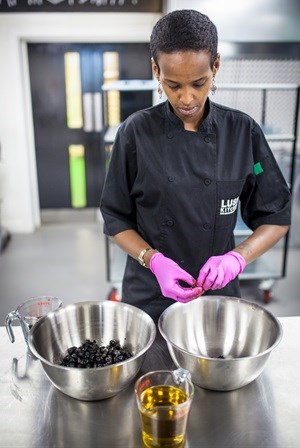Inside the lush life of an ethical cosmetics buyer
Working as a buyer for ethical handmade cosmetics company Lush, your travels may take you sourcing neroli oil in Tunisia, blue chamomile oil in Hungary, benzoin resin in northern Laos and shea butter in Ghana. The expedition is guided by Lush’s ethical purchasing policy, which is rooted in animal welfare, workers’ rights and environmental protection.

Gabbi Loedolff
The company supports Fair Trade and Community Trade, is an active campaigner against animal testing and works to create a regenerative supply system that gives back to local communities more than it takes away.
Here, SA-born Lush UK buyer Gabbi Loedolff talks about the importance of transparency and collaboration in the supply chain, provides insight into the company’s sourcing strategy and shares what she loves most about being a ‘Lushie’.
What are the challenges associated with working in an ‘ethical’ purchasing department?
We call our approach to supply chain management ‘creative buying’; we find creative solutions to complex challenges, looking beyond the lowest price and bottom line to source top quality ingredients in a way that has maximum positive environmental and social impact. With a growing business that operates at a fast pace, it is a challenge to ensure that we meet the needs of the business while maintaining ethics and working towards our long-term goals.
The starting point is to ensure that we always follow our guidelines for non-animal testing. We do not buy ingredients from companies that order or carry out animal testing. With companies merging and bringing new products to market, we need to ensure our suppliers continue to comply with our policy.
We constantly seek to have the greatest possible positive environmental and social impact through our purchases. We need a broad view of the materials we buy, and our purchases are never complete – we’re always evaluating our supply base to see if there are more ways to improve.
We want to move beyond the concept of “sustainable”, which is essentially keeping things as they are, towards “regenerative”. Many systems are already so degraded that it is not enough to keep them as they are. When we talk about working towards environmental and social renewal, we mean creating systems that give back more than they take. This is an ever-evolving process as there are always ways to improve our procurement and supply chains.
We need to keep abreast of developments in the wider industry and continue to build our expertise in appropriate technologies, sustainable agriculture and the like to apply to our tasks. Communicating the work we do can also be challenging – we work with complex issues in depth and need to find clear, concise ways to communicate this and the challenges that arise in a way that is accessible and transparent.

In your opinion, what are the cornerstones of an ethical supply chain?
Transparency and a collaborative approach. Ethical supply chains should benefit all parties involved and be based on considerations beyond purely economic ones. Working directly with growers and producers, or working to ensure end-to-end transparency in more complex supply chains, enables informed decision-making.
The more transparent a supply chain is, the easier it is to highlight best practices and areas for improvement. It is crucial to create systems and relationships where any challenges or concerns can be resolved in a collaborative, honest way to achieve the best results for all parties. When you have established relationships, trust grows and can enable open and constructive dialogue. All parties benefit from the continuous success of the various actors in the supply chain, and it is crucial to work together to create systems that work for all parties.
As a company, it is very important to set clear expectations and standards for supplier relationships. We have a large scope for (positive) environmental and social influence through where we choose to spend our money and also to influence the way companies (suppliers) operate.
Trade must be fair – to ensure our long-term supply, we must ensure that we pay our suppliers fair prices and pay invoices on time.

Lush sources a range of natural ingredients from suppliers around the world. Tell us about this procurement process and how suppliers are checked against greenwashing.
Our shopping is never finished; there is always room for further improvement. There are a number of different ways we go about finding ingredients. In some cases, we receive a request from the product creators for a specific ingredient. In this case we will investigate where it has grown, work with our existing network of suppliers to see if anyone can supply a sample. If not, we look for suppliers who stock the material to obtain initial samples. Other times we may come across interesting new ingredients while visiting suppliers and bring these back to the product creators to provide some inspiration and see if they are interested in using them.
For all our purchases, the declaration of non-animal testing is the first step. All suppliers must comply with our non-animal testing policy which ensures that our suppliers do not carry out or commission animal testing. The declaration is completed by all suppliers at the start of our relationship and then again annually, where our policy is independently verified by the Ethical Consumer Research Agency to ensure we uphold our Lush policy!
For materials that are considered to have risks associated with them, such as cocoa and the risk of child and slave labor in our supply chains, we will look at using a third-party certification as further confirmation that our supply chains meet our guidelines. All our cocoa is Fairtrade and organic certified and we work with specific origins to meet our requirements.
Developing strong, long-term purchasing relationships is also key to robust supply chains. We believe in visiting our suppliers and producers wherever we can to see cultivation and processing at first hand. Visits not only help to strengthen relationships, but also create transparency and build our knowledge and understanding of how our materials are produced. This gives us an opportunity to identify any areas for improvement in collaboration with our suppliers, and work to drive further improvements.

We have a detailed purchasing questionnaire that we ask suppliers to complete that focuses on environment, labor and growth practices (where relevant) which helps us build a better overview of the companies we work with. We can refer to this as a baseline when we visit to see how the practice on the ground compares to the responses. If there are any areas of concern that we identify either through review of the questionnaire or during visits, we will raise these with our suppliers and work together to create an action plan to bring about improvements.
All our buyers train with the Ethical Trading Initiative on best work practices for ethical supply chains based on the ILO’s core conventions. This provides a strong basis for setting standards and assessing our supply chains from a labor rights perspective.
What would you say are the key ingredients in a mutually beneficial supplier-retailer relationship?
Respect, openness, flexibility and cooperation. The ability to collaborate to innovate and create solutions that work for both parties is key. I believe that our suppliers are critical to our success and ability to meet the needs of our business; we benefit from their expertise and skill as much as they benefit from our business.
What do you like best about working for Lush?
At Lush, ethics are not imposed through a CSR policy, but are instead the integral building blocks around which the company was formed. When you work for Lush, you’re really able to turn your passions into your job – there’s not a set career path employees have to follow; the opportunities to combine your interests with the evolving needs of business are endless.
As a buyer for Lush, you learn every day. We work with a lot of autonomy and it really is a role where you can make a difference, not just within the business, but on a much wider platform. Being able, and encouraged, to visit our manufacturers to learn from them, share our knowledge and identify further opportunities for the future is a wonderful privilege.
I love working for a company that really cares. Not just about the bottom line, although of course we need to make money to be able to do the things we do, but about the environment, people (internally and throughout our supply chains) and animal welfare. Lush is a campaigning organization that uses its physical (stores) and digital (websites, social media channels) platforms to raise awareness of causes we believe in.
Shop Lush online and connect with the brand on Facebook, Twitter and Instagram.



